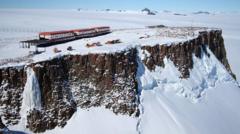The Sanae IV research station, a remote South African facility in Antarctica, has come under distress after an alleged physical assault among team members. This incident has cast a shadow over the nine researchers who were anticipating months of collaborative work in extreme conditions, approximately 170 kilometers from the ice shelf.
Reports confirm that a representative from the South African government acknowledged the occurrence of an assault, following previous claims of inappropriate behavior. The South African environment ministry has expressed urgency in addressing these serious allegations. Those stationed at the base were fully evaluated before deployment, clearing several checks, including medical and psychological assessments.
Despite being deemed "all in order" at the time of departure for Antarctica on February 1, distress signals from team members emerged later in the month. South Africa's Sunday Times disclosed claims of "deeply disturbing behavior" by a colleague, citing an environment of fear within the camp. The ministry has since emphasized its commitment to mediation efforts aimed at restoring morale and interpersonal relations.
Along with the assault allegations, ongoing investigations regarding claims of sexual harassment are underway, although the ministry clarified that reports of sexual assault had been inaccurately stated. An official stated that the alleged perpetrator has engaged cooperatively in psychological evaluations and issued an apology to the affected party, demonstrating a willingness to comply with recommended interventions.
The Sanae IV station typically operates with a crew comprised of various specialists, including a doctor, engineers, and physicists, and is known for functionally engaging under such harsh conditions. Historically, incidents at these remote research bases have been minimal, with the issue of social dynamics magnified by extended isolation.
Experts on workplace psychology narrate that close quarters in environments like Antarctica can precipitate conflicts over seemingly minor issues, as heightened stress levels may lead to larger disputes. The confined living situations often compel team members to become acutely aware of each other’s habits, sometimes triggering tensions.
Additional support resources for the beleaguered research team are considered, yet any potential evacuation efforts must tackle the severe weather conditions, compounded by sub-zero temperatures and fierce winds that make travel challenging.
The community remains hopeful for a swift resolution as South Africa navigates the crisis at its Antarctic base, where scientific endeavors have taken place since 1959.
Reports confirm that a representative from the South African government acknowledged the occurrence of an assault, following previous claims of inappropriate behavior. The South African environment ministry has expressed urgency in addressing these serious allegations. Those stationed at the base were fully evaluated before deployment, clearing several checks, including medical and psychological assessments.
Despite being deemed "all in order" at the time of departure for Antarctica on February 1, distress signals from team members emerged later in the month. South Africa's Sunday Times disclosed claims of "deeply disturbing behavior" by a colleague, citing an environment of fear within the camp. The ministry has since emphasized its commitment to mediation efforts aimed at restoring morale and interpersonal relations.
Along with the assault allegations, ongoing investigations regarding claims of sexual harassment are underway, although the ministry clarified that reports of sexual assault had been inaccurately stated. An official stated that the alleged perpetrator has engaged cooperatively in psychological evaluations and issued an apology to the affected party, demonstrating a willingness to comply with recommended interventions.
The Sanae IV station typically operates with a crew comprised of various specialists, including a doctor, engineers, and physicists, and is known for functionally engaging under such harsh conditions. Historically, incidents at these remote research bases have been minimal, with the issue of social dynamics magnified by extended isolation.
Experts on workplace psychology narrate that close quarters in environments like Antarctica can precipitate conflicts over seemingly minor issues, as heightened stress levels may lead to larger disputes. The confined living situations often compel team members to become acutely aware of each other’s habits, sometimes triggering tensions.
Additional support resources for the beleaguered research team are considered, yet any potential evacuation efforts must tackle the severe weather conditions, compounded by sub-zero temperatures and fierce winds that make travel challenging.
The community remains hopeful for a swift resolution as South Africa navigates the crisis at its Antarctic base, where scientific endeavors have taken place since 1959.






















